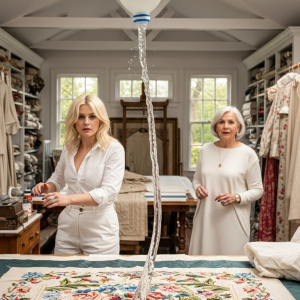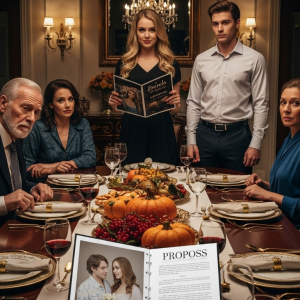The Sterling family worshipped at the altar of academia. Their family home wasn’t just a house; it was a museum of achievement, the walls lined with framed degrees like holy relics. At the center of this shrine was Richard Sterling Jr., a man who seemed assembled from a university prospectus: Phillips Exeter, Yale undergrad, and the crown jewel, a Harvard MBA, a fact his father never failed to mention.
Then there was Alex. The family’s apostate. The “black sheep” who had committed the ultimate Sterling sin: he had dropped out of college. He had walked away from a full scholarship in computer science to chase what his father, Richard Sr., had called “a childish, digital fantasy.”
Sunday dinners were a weekly tribunal where Alex’s life choices were subtly, or not so subtly, cross-examined. Richard Jr., impeccably dressed and oozing confidence, would hold court, discussing market penetration strategies and leveraging assets, his language a dense thicket of MBA jargon. Richard Sr. would listen, beaming with pride.
“Richard just closed a landmark distribution deal in Germany,” Richard Sr. announced one evening, raising his wine glass. “His Harvard case studies predicted the market shift perfectly. It’s all about having the right theoretical framework, you see.”
Then, all eyes would turn to Alex, in his simple, unbranded sweater and jeans. “And you, Alex?” his father would ask, his tone laced with a familiar blend of pity and condescension. “Still tinkering with your little… freelance projects?”
“The project is going well, Dad,” Alex would reply calmly, offering no details. “We’re making progress.”
He lived a life of infuriating simplicity. He drove a modest car, lived in a small, rented apartment, and seemed utterly unconcerned with the family’s relentless pursuit of status. This quiet contentment was, to his family, the most damning evidence of his lack of ambition. They couldn’t see the steel beneath his calm exterior, nor could they see the cracks forming in their own gilded cage.
Lately, the cracks in Sterling Manufacturing, the family’s legacy business, had become impossible to ignore. Richard Jr. was often on the phone, his voice tight and strained. There were hushed arguments with his father behind the closed doors of the study. Whispers of returned shipments and cancelled orders. But in public, the façade of Sterling perfection remained impenetrable.
The façade finally shattered on a cold November evening. The family was gathered for another Sunday dinner, but the usual air of smug satisfaction was gone, replaced by a thick, suffocating tension. Richard Jr. had barely touched his food, his face pale and drawn. Richard Sr.’s usual bluster had evaporated, leaving behind a brittle, anxious old man.
After the plates were cleared, Richard Sr. stood, his hands trembling slightly as he rested them on the back of his chair. He looked at his eldest son, a silent cue.
“We have… an announcement to make,” Richard Jr. began, his voice, usually so resonant with authority, now thin and strained. He couldn’t bring himself to look at anyone. “Due to… unforeseen market volatility and some aggressive competitive tactics… the German expansion has failed.”
“Failed?” his mother whispered, her hand flying to her mouth.
Richard Jr.’s composure finally broke. “It’s more than failed. It was a catastrophe. We’re over-leveraged. The creditors are calling in their loans. We need a massive capital injection within thirty days, or we lose everything. The company… it’s on the verge of bankruptcy.”
He finally looked up, his eyes wild with a panic no Harvard case study had ever prepared him for. “We need a miracle,” he said, his voice cracking with desperation.
In the stunned silence that followed, a strange and telling dance occurred. Richard Sr.’s gaze darted to his wife. She looked to Richard Jr. Richard Jr. stared at the tabletop, a man adrift in the wreckage of his own making. Their collective gaze, a frantic search for a savior, swept across every face in the room, but it never once landed on Alex. He sat at the end of the table, a ghost at the funeral of his own family’s legacy, completely and utterly invisible. To them, he was not part of the solution because, in their eyes, he had never even been part of the equation.
The weeks that followed were a blur of humiliation and despair. The name Sterling, once a key that opened any financial door in the city, was now a liability. Richard Jr., armed with his glossy pitch decks and financial models, was systematically rejected by every bank and investment firm he approached. The story was always the same: the company was a relic, its management was stuck in the past, and its debt was toxic.
The family home, once a symbol of success, began to feel like a tomb. The two Richards became gaunt figures, their expensive suits hanging off them like costumes. The swagger was gone, replaced by the hollowed-out look of defeat.
Just as the thirty-day deadline loomed, a single, unexpected ray of hope emerged. Their private banker called.
“I’ve exhausted all our usual channels, Richard,” the banker said, his voice cautious. “But I made one last call, a long shot. There’s a new player in the tech investment world. Incredibly private, incredibly successful. He almost never deals with old-world manufacturing, but for some reason, the Sterling name caught his attention. He’s agreed to a meeting.”
Hope, desperate and blinding, flooded the Sterling household. “Who is it?” Richard Jr. asked, his voice trembling. “What’s his name?”
“He prefers to remain anonymous until the meeting,” the banker replied. “All I can tell you is that he’s the real deal. He runs a holding company called Nexus Dynamics. Be prepared. These new tech billionaires… they don’t play by the old rules.”
The day of the meeting, Richard Sr. and Jr. put on their finest suits, a final, defiant act of clinging to their old status. They were driven to a sleek, towering skyscraper of black glass and steel that seemed to pierce the clouds. This was a temple of new money, a world away from their ivy-covered clubs and wood-paneled offices. As they stepped into the elevator that whisked them silently to the penthouse floor, they felt like pilgrims coming to beg for salvation from a mysterious, all-powerful deity. They were about to be saved by a stranger, a validation, in their minds, that their world still mattered.
The boardroom was an exercise in minimalist power. A single, massive table of polished granite faced a wall of floor-to-ceiling glass that offered a god-like view of the city below. The two Richards sat, small and nervous, clutching their briefcases.
The banker entered, his demeanor a mixture of reverence and anxiety. “Gentlemen, thank you for your patience. The principal is on his way. I must stress, he is a very direct man. He has already reviewed your entire financial history, in meticulous detail.”
The door to the boardroom hissed open. Richard Jr. and Sr. straightened their ties, ready to plead their case, to sell their legacy to the anonymous face of their salvation.
A man stepped into the room. He was not old and grizzled, but young and vital. He moved with an easy, unforced confidence. He was dressed not in the flamboyant style of a new-money peacock, but in a bespoke, perfectly tailored suit of charcoal grey that spoke of quiet, absolute power.
It was Alex.
Time seemed to stop. Richard Sr.’s jaw went slack, a look of pure, uncomprehending shock on his face. Richard Jr. simply stared, his face draining of all color, his Harvard-trained mind blue-screening as it failed to process the impossible data before it.
The banker, oblivious to the family drama, smiled. “Richard Sterling Sr., Richard Sterling Jr., allow me to introduce the founder and sole principal of Nexus Dynamics… Mr. Alex Sterling.”
Alex walked to the head of the table and took his seat. He didn’t smile. He didn’t offer a handshake. He looked at his stunned father and brother, his expression not of triumph, but of cold, hard assessment.
He slid a thick, leather-bound portfolio across the granite table. It landed in front of them with a heavy, final thud.
“Let’s dispense with the pleasantries,” Alex said, his voice calm and sharp as a surgeon’s scalpel. “You’re not here for a loan. The bank won’t give you a loan because Sterling Manufacturing, under your leadership, is a catastrophically bad investment. It’s emotionally managed, over-leveraged, and values academic theory over market reality.”
He leaned forward. “I’m not interested in being your creditor. Throwing more money at your incompetence would be an insult to Grandfather’s memory. That document is not a loan agreement. It is a takeover proposal. I am buying the company, the assets, the brand, and every last dollar of your debt. I am saving Grandfather’s legacy from you.”
The destruction of Richard Sterling Jr. was not a loud, fiery explosion, but a quiet, clinical disassembly. The document Alex had provided was brutally simple. Nexus Dynamics would acquire 100% of Sterling Manufacturing, making all creditors whole and saving the family from personal bankruptcy and public disgrace. In return, Richard Sr. would be forced into immediate retirement, and Richard Jr. would be… reassigned.
They had no choice. It was either accept this profound, personal humiliation, or face absolute ruin. With trembling hands, they signed.
The following Monday was Richard Jr.’s first day in his new role. He arrived at the company he was once destined to lead, not to his spacious corner office on the top floor, but to a small, windowless cubicle in the basement, next to the archives. His new title was printed on a flimsy piece of paper taped to the cubicle wall: “Management Intern.”
His new boss was a man named Frank Coleman, the new Chief Operating Officer appointed by Alex. Frank was a legend in the manufacturing industry, a gruff, no-nonsense veteran who had started his career on a factory floor forty years ago. He had no college degree, but he had forgotten more about running a business than Richard Jr. had ever learned.
Frank dropped a thick, grease-stained binder on Richard’s tiny desk. “Morning, Harvard,” he grunted, not unkindly. “First lesson. This is a list of every supplier contract you personally negotiated for the German expansion. I want a full report on my desk by Friday explaining why every single one of them was a rip-off. Use small words. I didn’t go to Yale.”
For Richard Jr., this was a descent into hell. His MBA, his shield and his sword, was utterly useless here. He was stripped of his title, his authority, and his pride. He was forced to learn the business from the very bottom, to confront the real-world consequences of his theoretical, textbook-based decisions. The destruction was total.
For Richard Sr., the destruction was quieter, but no less profound. He was now a guest in the empire he had once ruled. He had to watch as the son he had dismissed and ridiculed systematically undid the damage caused by the son he had worshipped. He had to face the catastrophic failure of his own judgment, a truth more bitter than any financial loss.
Alex did not run the company with the arrogance of a conqueror, but with the precision of an engineer. He saw the flaws in the system not as personal failings, but as inefficient code that needed to be rewritten. He invested heavily in new technology, streamlined production, and, most importantly, he listened to the people on the factory floor, the ones who, like Frank Coleman, actually knew how things worked.
He didn’t just save Sterling Manufacturing; he transformed it. Within a year, the company was not only stable but more profitable and innovative than it had ever been in its seventy-five-year history.
Richard Jr., meanwhile, was undergoing his own transformation. The initial humiliation slowly gave way to a grudging respect. Forced to work alongside machinists, shipping clerks, and salespeople, he began to see the business not as a set of abstract theories, but as a living, breathing ecosystem of people. He learned to listen. The arrogance, stripped away by his public humbling, was gradually replaced by a quiet competence.
One year after the takeover, Alex was walking the factory floor with Frank. In the distance, he saw his brother, Richard, not in a suit, but in a polo shirt and safety glasses, deep in a respectful conversation with a shift foreman, pointing at a piece of machinery and nodding intently. He was no longer lecturing; he was learning.
Later that week, Alex visited his father. The old man was in his study, a room now filled with books on history and art instead of business journals. He looked smaller, but more at peace.
They sat in silence for a few minutes, watching the sun set.
“The quarterly reports are incredible,” Richard Sr. said quietly, not looking at his son. “Your grandfather… he always said this company was about making good products and taking care of good people. He would have liked what you’ve done.”
He finally turned to face Alex, and for the first time, the look in his eyes was not one of disappointment or pity. It was a look of raw, unguarded admiration.
“I was wrong,” the old man said, his voice thick with emotion. “About everything. About you. I’m proud of you, Alex. I am so, so proud.”
Alex simply nodded, accepting the words that had been a lifetime in coming. He hadn’t just bought back a company. He had bought back his family. He had saved his brother from his own arrogance, saved his father from his own prejudice, and in doing so, had finally, truly, come home.




